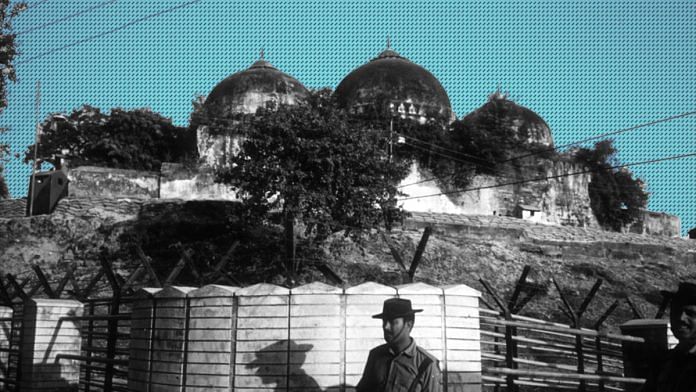The Supreme Court Friday put the onus of settling the Ram Janmabhoomi-Babri Masjid title dispute case on a three-member mediation panel. It will be headed by former SC judge F.M. Ibrahim Kalifulla, and comprise Art of Living founder Sri Sri Ravi Shankar and senior advocate Sriram Panchu. The panel has eight weeks to arrive at a decision.
ThePrint asks: Is mediation on Ayodhya issue the ideal process or is the Supreme Court conveniently passing the buck?
Mediation attempt will empower Hindutva forces to evoke Ayodhya issue in LS polls
 Hilal Ahmed
Hilal Ahmed
Associate professor, CSDS
The proposal that the Ayodhya dispute may be settled through mediation is not entirely new. Several rounds of talks between the competing parties, often classified as “Hindu” and “Muslim”, have already been organised by the government in the past. In this sense, the ‘proposed act of mediation’ must be seen in relation to the evolving narrative of Hindu victimhood.
Two crucial points must be kept in mind.
First, the competing parties have successfully established themselves as the “representatives” of Hindus and Muslims religious communities. The public debate is organised in such a way as if the Ayodhya dispute is a civilisational conflict between Hinduism and Islam. This portrayal of the dispute has contributed to the Hindutva narrative that Hindus and Muslims are two nations — something that the Muslim League successfully used for nurturing Muslim communalism in the 1940s.
Second, the timing of ‘mediation’ is also very interesting. The proposed mediation will empower the Hindutva forces to evoke the Ayodhya issue during the forthcoming election even if they say ‘no’ to it. At the same time, it will also help the Muslim elite to bargain with political parties, including the BJP, to carve out a possible space for them.
No need for mediation after the Allahabad high court’s verdict in 2010
 Arun Anand
Arun Anand
CEO, Indraprastha Vishwa Samvad Kendra, and author of Know About RSS
The mediation route to resolve the Ayodhya issue is not a new idea. It has been tried before, during the regimes of PV Narasimha Rao and Chandrashekhar, but did not yield any concrete results.
The Allahabad High Court had in 2010 divided the land into three parts while ruling both Hindus and Muslims as title holders. In principle, all parties had agreed prior to the high court’s judgement that if it is proved that there was a temple at Lord Ram’s birthplace in Ayodhya, then a new temple should be allowed to be constructed there.
The case in the Supreme Court refers to a title suit for some part of the land on which Hindus want a Ram temple constructed. So, in light of the Allahabad high court’s judgment, which had examined the archaeological evidence, and the fact that the appeal against its verdict in the Supreme Court was merely a tactic to delay the construction, the question of mediation should not arise.
It is ironical that after more than a century of litigation on this issue, a handful of people are allowed to make the mockery of not only the faith but also of the principles of justice.
Also read: What about Babri Masjid? How land became more important than the mosque in Ayodhya
Sending Ayodhya dispute to mediation panel sign of an inconsistent judicial system
 Virag Gupta
Virag Gupta
Advocate, Supreme Court and author, Ayodhya’s Ram Temple in Courts
The Supreme Court’s five-judge Constitution bench was formed after nine years of pendency in the Ram Janmabhoomi-Babri masjid dispute case. The history of this case is indicative of muddled thinking and reluctance on part of the judges. Referring it now to a mediation panel poses questions on the inconsistency of our judicial system.
If it is a case of a simple title suit, then what necessitated the formation of a Constitution bench? And if it is a matter of faith and religious beliefs, then how can the Supreme Court pass a verdict in this case?
A presidential reference sent to the Supreme Court in 1993 asked the court to observe on, “whether a Hindu temple or any Hindu religious structure existed prior to the construction of the… Babri masjid” on the disputed site. The Constitution bench headed by then Chief Justice of India M Venkatachaliah respectfully declined to comment on the it. So how can a new Constitution bench decide this case without due consideration of religious sentiments, mythology and archaeological evidence?
Even if this attempt of mediation succeeds, it will be difficult to enforce the outcome on the non-parties, who could start a new round of litigation. In view of the fact that the central government has acquired the disputed site and the surrounding land, in case mediation fails, the Supreme Court should direct the Centre to join as a party and file an affidavit to abide by all its judgments in the present appeals.
Mediation should be a win-win situation for all stakeholders in Ayodhya dispute
 Shahid Siddiqui
Shahid Siddiqui
Political commentator
Informal mediation efforts to resolve the Ayodhya issue are as old as the dispute itself. During VP Singh’s government in 1990, there were very serious efforts for mediation — both before LK Advani’s rath yatra and later. Chandrashekhar was on the verge of finding a solution acceptable to all sides but his government fell. All these attempts failed more because of the politics involved than due to faith or religion. And then the demolition of Babri masjid aborted any serious chances of finding a resolution.
The Supreme Court’s effort in this direction is the first formal, legal attempt to resolve this age-old issue. It would not have been possible or prudent for the court to resolve it legally; the matter can only be resolved through mediation. Most of the Muslim leaders, both religious and political, have welcomed the mediation efforts. It will be resolved if the Muslim parties don’t consider it only as a property dispute and respect the sentiments of the majority community.
But the solution shouldn’t be arrived at under pressure and as a victory for any one section. Let there be a grand Ram temple in Ayodhya and a small Babri mosque nearby to respect the sentiments of both communities and have a win-win situation for all parties to the dispute. India of the 21st century must move on from the disputes of the medieval era.
Mediation move reaffirms public opinion that SC is not serious about Ayodhya
 Sangit Ragi
Sangit Ragi
Professor of Political Science, Delhi University
After being stuck in the quagmire of legal dereliction, the Ayodhya issue now moves to a mediation panel. The people of the country are confused — was the bench of former Chief Justice of India Dipak Misra wrong when it decided to view the Ayodhya case as a matter of title suit dispute or is the present bench wrong in referring the matter to the mediation panel on the grounds that it is a matter of faith and sentiments? Painfully, it took four months for the court to decide this, which effectively means zero headway.
It has accentuated the popular feeling that the apex court is not serious and dragging the issue in pretext of certified translations of the documents and making frequent postponement of hearings and long dates.
Needless to say, the court’s decision is bound to fail like the earlier two instances (during the regimes of PV Narasimha Rao and Chandrashekhar).
First, Hindus know that facts and arguments favour them in the court and therefore, there is no need to compromise. Secondly, it is the declared position of the Hindus that no space should be conceded at the disputed site in Ayodhya. The dispute moved from being an issue between two individual parties to a contest between the two communities. Mediation through a panel is not going to solve it at all.
By Fatima Khan, journalist at ThePrint.




Why Sri Sri ? By what qualification?
After watching Cut the Clutter, further doubts arise. It is one thing for the Supreme Court to pass an order on merits. Decide and be damned. So long as the judgment is sound on law, the losing side has no recourse, except come onto the streets in protest, as happened with the Cauvery river award. However, any final order, based on mediation, would incur the wrath of the losing side, which would feel cheated and let down. 2. What precisely is the sanctity of mediation ? Many are questioning the impartiality of Sri Sri, who said there would be bloodshed if the verdict is against the temple. One billion Hindus on one side, 180 million Muslims in the other – to put it in very crude terms – neither will accept the fruit of the endeavours of three men, including two erudite men of law whose names 99.9% of Indians are unfamiliar with. Whom will they talk to, during the course of mediation, apart from the litigants ? 3. I agree with Shri Shekhar Gupta that the apex court has placed a lot of its institutional capital on the outcome very uncertain, if not fruitless, enterprise. Place a hand on your heart and say whether, in today’s India, it is possible that the result of the mediation will uphold the rights of the Muslim community to a piece of hallowed ground on which a place of worship for their community had stood secure for more than 450 years. As a fair minded Hindu, it seems to me that, one way or another, the whole effort will be to beguile, seduce, bully, threaten, coerce – depending on what works best – the Muslim community into acquiescing into the construction of a temple on this site.
This is an example on how court and justice want to pass the buck to future justices. they have no idea of the feelings of people – both Hindu and Muslims, which can again cause a disaster like 6th Dec. Hope we remember that at that time also HC reserved their judgement and came out only after a disaster.
May be court want to exercise all options before providing any judgement but this exercise will not give any result.